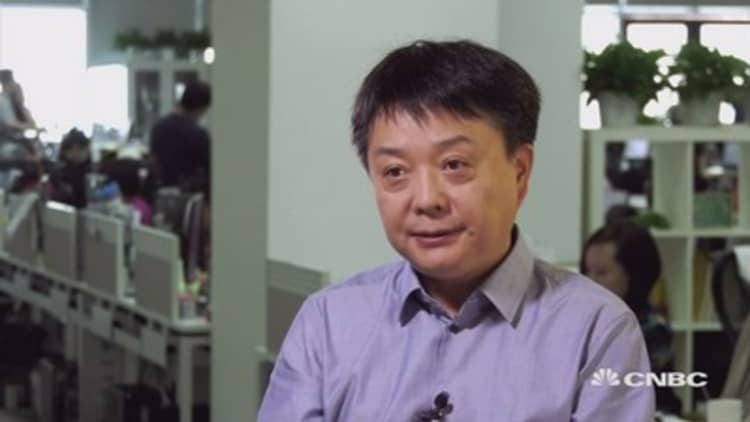
BEIJING, China — Chinese tech firm Xiaomi plans to flood the world with 2,000 new stores within the next three years, a company executive told CNBC.
Half of those shops will be opened overseas with partners and the other half will be owned and operated by Xiaomi in China, and it's all part of the company's big ambitions to keep growing abroad, said senior vice president Wang Xiang, who oversees the firm's global strategy. In the next few years, "we will definitely be a global player," he said.
"You will see us in almost every country," Wang projected.
Beijing-based Xiaomi started out selling low-cost smartphones and exploded as one of the world's leading vendors within a handful of years. It even set a Guinness World Record for selling the most number of phones ever in a single day — 2.12 million units.
Since then, the firm has added products, including smart fitness bands, smart scooters, smart air purifiers, and more, splashing out to more than 40 countries and regions. The brand, which primarily sells direct to customers via online channels, or via distribution partnerships, has become so popular in China that at times it's easy to forget that the start-up only launched in 2010.
It's a company that's also taken a cue from Silicon Valley company culture. Xiaomi's young employees buzzed around headquarters on Monday, surrounded by tons of stuffed Mi bunnies — the firm's cute white rabbit icon — perched on shelves and desks. Walls were dotted with reprints of iconic works by artists including Vincent van Gogh and Camille Pissarro. One staffer traveled in the office via Xiaomi's own smart scooter, as people streamed in and out of the canteen chatting about work and weekend plans, and screens showed photos of members of the Mi soccer club.
Big global expansion plans
This year, Xiaomi has already expanded into countries including Russia, the United Arab Emirates and Egypt, and is even manufacturing devices locally in India and Indonesia. Next year, the company is looking to focus more on Southeast Asian nations such as the Philippines and in eastern Europe, Wang said.
And although Xiaomi's low-cost offerings — the RedMi 4A phone is 599 yuan ($88) in China — perhaps make more sense in developing markets, the company also wants to make inroads in places like western Europe.
Aside from building brand awareness abroad, Wang said Xiaomi has a peculiar problem with its affordably-priced phones and products. "If you buy a product from any shop with a low price, normally … your expectation is quality may not be good, but we want to prove you don't need to spend a lot of money to buy a high quality product," he said, deeming that "the most difficult challenge for us."
That's where the push to open more shops come in — "seeing is believing," Wang said. "You have to let the people try the product first." Brick-and-mortar stores may seem a departure from Xiaomi's e-commerce strategy, but the company says they've been a huge success in creating a seamless online-to-offline experience for customers.
Internet of things
Xiaomi also wants to get its popular portfolio of products to customers outside of China in hopes of leading the "internet of things," linking devices like smartphones to every day objects like televisions and coffee makers. Think lamps that shut down when you fall into a deep sleep or a rice cooker you can turn on before you get home. Xiaomi boasts it's paving the way as it already has 60 million devices connected to its online ecosystem.
To help with that, the firm last week announced it would cross-license patents with Nokia, a move that helps both companies develop new products. The deal gives the tech firms access to so-called standard essential patents — key ones that allow products to comply with an industry standard. Last year, Xiaomi inked a similar deal with Microsoft, buying up 1,500 patents.
The Nokia deal is a protective measure to "defend ourselves once we go into many, many more countries, according to Wang. "The key, actually, is to get more design freedom," he said. With "the patents we acquired, our engineers can design many, many more products more efficiently."
Despite the big international push, Xiaomi hasn't announced its revenues or the split between global and domestic sales. It is, after all, still a private company, and Wang declined to comment on any IPO plans. But the firm has been quick to tout its success in India, where sales hit $1 billion last year.
Bumpy road to the top
Xiaomi's exponential growth, though, has seen hiccups along the way. Supply chain issues have plagued the company — at first, Xiaomi wasn't able to ramp up production to meet customer demand.
But then, the firm's phone sales started slipping as it lost market share to competitors like Huawei and cheaper brands Oppo and Vivo — something industry analyst firms like Canalys have said happened before Xiaomi was able to find stronger growth with its other products.
On top of that, company executive Hugo Barra, who had been lured away from Silicon Valley, announced that he would leave the company and move back to the U.S. at the beginning of the year.
But it does seem things are turning around. On Friday, Xiaomi said it posted a record high with more than 23 million smartphone shipments in the second quarter of this year.
"Our recovery follows a year of setbacks that collectively signify the most challenging period in our company history," Xiaomi founder Lei Jun wrote in a letter to employees. But despite all of that, the firm is staying the course with big goals — to hit 100 billion yuan in sales this year, and to ship 100 million smartphones next year.


